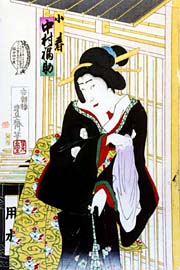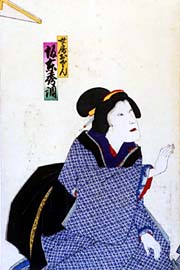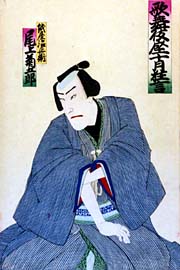| SHIGURE NO KOTATSU |
| Play title | Shinjű Ten no Amijima |
| Authors | Chikamatsu Monzaemon Chikamatsu Hanji |
| History |
The play "Shinjű Ten no Amijima" was originally written for the puppet theater (Bunraku) and staged for the first time in ďsaka at the Takemotoza in the 12th lunar month of 1720. It was based on a real event that happened in ďsaka the 14th day of the 10th lunar month of 1720: the double suicide in Amijima in the precinct of the Daich˘ji Temple of Kamiya Jihŕ (a paper merchant from the Tenma district) and the courtesan Kinokuniya Koharu (from the Kita-Shinchi pleasure quarter). "Shinjű Ten no Amijima" was adapted for Kabuki the following year and staged for the first time in Edo at the Moritaza. The roles of Kamiya Jihŕ and Koharu were played by Ichikawa Ebiz˘ II and Sodesaki Miwano I. |
| Structure |
The "Shigure no Kotatsu" act, which was not in the original 3-acts drama, was written for Kabuki by the playwright Chikamatsu Hanji in 1781. |
| Key words |
Ganjir˘ Jűnikyoku Gidayű Ky˘gen Kotatsu Miuke Sewamono Shinjűmono |
| Summary |
Although Jihŕ has a devoted wife and children, he falls in love with the courtesan Koharu and cannot bear to part from her. Unfortunately, she is about to be redeemed by one of her clients. Jihŕ sits at home under the kotatsu. He pretends to be asleep but his eyes are full of tears thinking about Koharu. This is where the title of the drama comes from. His wife, Osan, goes about the household chores. When their servant tells her that her mother and Jihŕ's elder brother, Magoemon, are on their way to call on them, Jihŕ goes to the shop front and makes himself look busy. In order to relieve them from anxiety about his selfish deeds, Jihŕ writes a sworn statement to the effect that he has broken with Koharu forever. But, in fact, he and Koharu have firmly promised to die together for the sake of true love. Similarly, Koharu does her duty to Osan and Magoemon by bidding Jihŕ good-bye at the teahouse Kawash˘, pretending that she has become tired of him. Osan's women's intuition, however, tells her that her husband cannot forget Koharu. She realizes the two will commit double suicide if they cannot live together, and it will be her fault. She makes up her mind, therefore, to divorce Jihŕ to prevent such a tragedy. She implores Jihŕ to go to Koharu immediately and ransom her before she is bought by the other client. Osan donates what money she has and offers to sell her clothes and the children's to raise the full amount of the ransom. Just then Osan's father, Gozaemon, comes. He discovers that the chest of drawers is empty, and Osan's clothes are all bundled up. He is convinced that Jihŕ is stealing his wife's clothes to pay for his dissipation and peremptorily drags Osan away, leaving the weeping children with Jihŕ. Later Jihŕ and Koharu marry, but when they find out that Osan has become a nun they come to their senses. Koharu praises Osan's unselfishness and hints to Jihŕ that she intends to kill herself because of the sorrow she has caused her. Jihŕ, too, tells Koharu that he will die with her to atone for his sins against his wife. Thus they walk the road to death together at Amijima. This summary has been written by Watanabe Hisao and edited by Jeff Blair [website] |
 |
 |
 |
|
The actors Nakamura Fukusuke IV, Band˘ Shűch˘ II and Onoe Kikugor˘ V playing the roles of Kinokuniya Koharu, Osan and Kamiya Jihŕ in the drama "Sayo Shigure Ten no Amijima", which was staged in October 1900 at the Kabukiza (print made by Utagawa Kunimasa III) |
||
|
|
| Contact | Main | Top | Updates | Actors | Plays | Playwrights | Programs | Links | FAQ | Glossary | Chronology | Illustrations | Prints | Characters | Derivatives | Theaters | Coming soon | News |